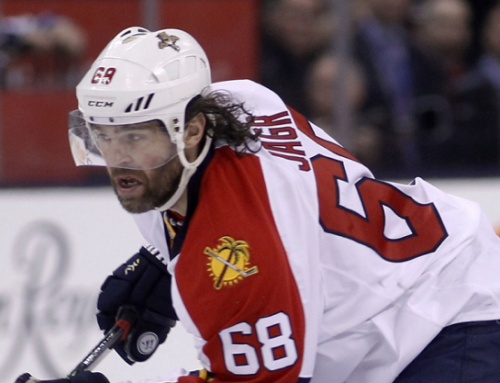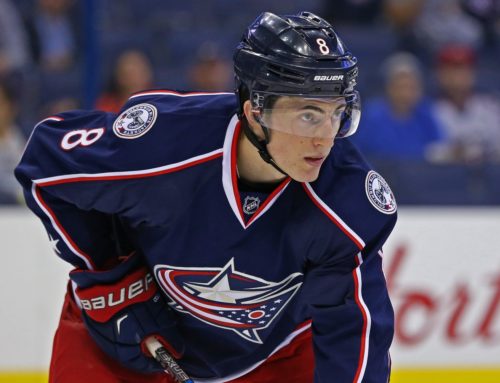
Immediately flipping an asset may not always yield the expected profit.
One common saying in professional team sports is, “To not trade within your own division/conference.” The reasoning is simple: You do not want your former player to haunt you in later seasons.
With that in mind, I take you back almost a year ago to when the Boston Bruins and Los Angeles Kings made the trade involving Milan Lucic.
Lucic was a year away from unrestricted free agency, which was a primary reason why the Bruins parted ways with him. The Kings, on the other hand, were betting on a good season and long playoff run.
As part of the return, the Kings gave the Bruins their first pick in the 2015 Entry Draft (13th overall), promising defenseman Colin Miller, and goalie Martin Jones.
Dean Lombardi, GM of the Kings, did not want to trade Jones to one of his divisional rivals (even conference) for fear that he would come back to ruin their chances to get into the playoffs and also win the cup.
Critics mostly thought that Bruins GM Don Sweeney got a great return. Then four days later, he flipped Jones over to the San Jose Sharks for prospect centre Sean Kuraly and the Sharks’ first-round pick in 2016. Critics thought it was a smashing home run.
Michael Felger flatly states that, “I think you’re going to have another top-ten pick out of that one, and who the hell knows how low they’re going to go. For Martin Jones?… Sorry to put a pause on the Don Sweeney bashing. That’s a good return.” He added, “San Jose, I think stinks and is going to continue to stink. San Jose is going down. They missed the playoffs last year, they drafted ninth this year. I don’t know how much better they’re going to be.”
A masterful head-fake to trade for something they did not really want, then parlay it into another package of a prospect and a pick for what was then a backup goalie.
Oh-oh. Jones ends up back in the Pacific Division. That was something that the Kings did not want, but Andrew Leafman of SB Nation’s Jewels from the Crown did not think that there was anything to worry about.
His first argument was how Jones could end up being a flop indicating that, “As a 25-year-old he should have a lot of productive years ahead of him,” and “There’s still definitely a chance he goes bad à la Jacob Markstrom or innumerable other failed goalie prospects, but he's a reasonable player for San Jose to take a chance on.”
Then he cites that they paid a lot for him. Maybe too much.
“[It’s] not at all implausible that San Jose just gave up what will turn out to be a top 10 pick for Martin Jones, which is not a great trade at all. If San Jose misses out on some dynamic skating prospect next year because of this trade, in the long run LA may be glad this happened.”
In another piece on Bleacher Report, Jonathan Willis comments favorably on Boston’s gamble, most notably on the first round pick. ”What makes the trade really interesting is the possibility of a big payoff, and the extent of a payoff depends upon the performance of Jones,” he wrote, and that was because the pick was not lottery protected.
There was hope, a chance, that the Sharks’ 2016 first round pick could land in the top-10, heck maybe even top-3 with the new lottery system that was being installed for the 2016 Entry Draft.
Willis’ conclusion was the “At worst, Boston got fair value back in the trade for Jones. But with some poor play from the goaltender and a little bit of help from the NHL lottery balls, the Bruins could find themselves in possession of a truly outstanding return.”
We make similar moves in our fantasy leagues. Although not technically correct, they are a version of arbitrage.
Arbitrage, as Merriam-Webster defines it, is, “The practice of buying something (such as foreign money, gold, etc.) in one place and selling it almost immediately in another place where it is worth more.”
Would Los Angeles have given their 2016 first-round pick and another valued prospect to the Bruins in the original Lucic deal? Probably not, but even if they did want to do that, the Bruins may have not wanted the Kings’ pick because they were more likely to succeed and/or they might not have been as interested in any other of the Kings’ prospects.
So what happened?
Los Angeles undervalued what they had and were focused on trying to bury Jones out of conference. Sure, they were running up against cap issues and constraints, but that it life in the cap system. You have to give yourselves some breathing room or else you get forced into moves you do not want to make.
San Jose knocking them out of the first round in the playoffs was an elbow to the face. The Kings possibly losing Lucic in free agency this summer will be a stinging punch that leaves them with a black eye.
Martin Jones didn't even play his best game and managed to make 44 saves. The Kings dealt him as PART OF A TRADE for Milan Lucic.
— Catherine Silverman (@CataCarryOn) June 10, 2016
The undervaluation allowed the Bruins an opportunity to flip him anywhere. That they got a return they liked from San Jose was inconsequential for Boston. It was what they wanted, and they probably had a good understanding of the Sharks’ appetite for Jones was before acquiring the goalie from LA.
All three prospects they got (Kuraly, Miller and Jakub Zboril – the pick from Los Angeles’ first round pick in 2015) are still prospects, but they may develop a few years from now into what Boston envisioned. One thing that they had not expected was that the 2016 first round pick would be 29th or 30th overall. The gamble was to be mid-range or better, and it failed.
However, the Bruins were the one team of the three that did not make the playoffs, and it should look bad on them. What was all this wheeling and dealing for if they do not improve their own team?
#Bruins get Rask instead of Pogge from #Leafs, trade Martin Jones instead of Rask to the #SJSharks. The Circle is now complete
— Zachary DeVine (@zakkthebear) June 10, 2016
That is the inherent risk with arbitrage. You focus on the short-term gain and it is usually a perceived gain in fantasy sports. The moves are meant to be quick and something of more value could be passing right through your hands, but you are looking to improve by +5 or +10. In this case, that the Sharks’ pick will be worse than predicted is a short-term minus, but that Jones floated through would be the bigger miss.
And what of those Sharks that looked like losers at the time of the trade?
The Kings were devoured by them on the ice, the Bruins are floundering like a fish out of water, and even though their Stanley Cup chances are not great, they are still alive and chomping. Even if they do not win a cup this season, they have a goalie they can build around.
As their GM, Doug Wilson stated in the earlier referenced Sportsnet article, “Martin was at the top of our list of players that we had targeted.”
There are times when it is best to keep it simple and let others stress out trying to make moves.
—
P.S. – Condolences to those that were connected to Gordie Howe and Muhammad Ali. May they rest in peace.
“Age is whatever you think it is. You are as old as you think you are.” – Ali





 MTL
MTL
 PIT
PIT FLA
FLA S.J
S.J MIN
MIN CGY
CGY L.A
L.A
